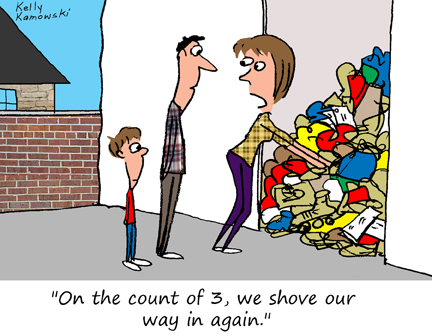My neighbor, knowing my line of work, left me this cartoon yesterday which of course made me laugh. It also got me thinking.
I often joke to my clients, you can say “crap” (or other expletives) just don’t say miscellaneous. A little professional organizer humor. It’s also a reminder that there is no such thing as the Miscellaneous Store. I’ve never seen a store aisle or store directory labeled as Miscellaneous.
Amazon and it’s vendors clearly understand that people don’t have time to sort and identify all the little knick-knacks of our lives. If you search the word miscellaneous on Amazon you’ll find an array of unrelated items that don’t have any apparent connection. Everything from colorful swim shorts to automotive engine parts to a denim tablecloth. There’s even something called a pantry wardrobe, presumably to contain all your “miscellaneous” pantry and wardrobe items. (Doesn’t everybody keep their canned peas with their pajamas?)
For a professional organizer, miscellaneous is a meaningless word.
There is no way to identify a miscellaneous item – it implies a quantity – for sorting or categorizing. Where do you donate miscellaneous to? We can’t assign a home to something called miscellaneous if we don’t first identify what it is and how it’s used. Junk drawers are notorious for containing miscellaneous items but try and find something in a junk drawer and you’ll probably leave empty-handed.
Miscellaneous is the catchall term for things that we commonly think of as clutter. The stuff (or crap) that we don’t want to spend the time sorting, purging, assigning a home to or containing.
We kid ourselves into thinking, we can always find it, if it’s in the “junk” drawer, but only if you can see what’s there. A junk drawer is nothing more than a cluttered garage in miniature.
When a client hires us to declutter their garage, We often show them how we will do it by using their junk drawer (or some similar storage area) and they get the idea right away! I also learn how they make decisions.
How we organize one thing is how we organize everything
Junk drawers, filled with “miscellaneous” stuff, are the perfect metaphors for how we organize everything. There’s nothing wrong with this. We have busy lives and not enough time to deal with it all. It’s okay to pick and choose how we spend our time and what we prioritize. Something’s gotta give.
So we buy a package of eight batteries when we only need two and the rest have to go somewhere. We put them in the junk drawer along with the rubber bands; half used package of oven bulbs; the small screwdriver; our kiddo’s missing puzzle piece; the pencil sharpener; the sewing kit; the half used bottle of aspirin; and that “part” that came from something else but we don’t remember what but we keep in anyway, just in case.
Then when we can’t find the thing we’re looking for, we go out and get it at the store that sells, “Miscellaneous Junk Drawer Crap.”
For a quick primer on how to organize a junk drawer, take a look at this video we did a while back.



